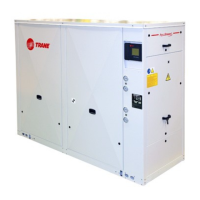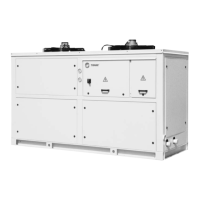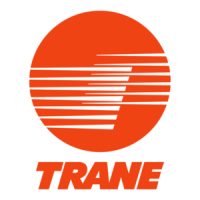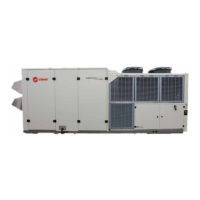Maintenance
57CG-SVX06D-E4
Annual preventive visit
• Check water flows and interlocks
• Check expansion tank pressure
• Check glycol concentration in the
chilled water circuit if glycol
presence is required
• Check operational set points and
performance
• Calibrate controls and pressure
transducer
• Check operation of all safety
devices
• Inspect contacts and tighten
terminals
• Megger the motor compressor
windings
• Record operating pressures,
temperatures, amperages and
voltage
• Carry out leak test
• Check configuration of unit
control module
• Carry out oil analysis
• Change the oil as required based
upon results of the oil analysis
• Check operation of
machines/compare conditions of
operation against original
commissioning data
• Fill out the annual start up visit
log sheet and review with the
operator
• Check and clean the strainer
CAUTION:
• Please refer to specific Trane
documentation on oil, available
from your nearest Trane office.
Oils recommended by Trane have
been exhaustively tested in Trane
laboratories to the specific
requirement of Trane chiller and
hence the user's requirements.
Any use of oils not meeting
specifications recommended by
Trane is the responsibility of the user
only, who thereby is liable to
warranty loss.
• Oil analysis and oil test acidity
must be carried out by a qualified
technician. Poor interpretation of
results may cause unit operating
problems. Also, oil analysis must
follow the correct procedures, to
avoid accidental injury to
maintenance personnel.
• If the condensers are dirty,
(Remote condensers) clean them
with a soft brush and water. If the
coils are too dirty, consult a
cleaning professional. Never use
high pressure water to clean
condenser coils.
• Contact Trane Service for
information on maintenance
contracts.
WARNING:
Switch off unit main power supply
before to any intervention. Failure to
follow this safety instruction can lead
to injury or death of the maintenance
personnel and may also damage
equipment.
CAUTION: Never use steam or hot
water above 60°C to clean condenser
coils (Remote condensers). The
resulting increasing pressure could
cause refrigerant loss through the
safety valve.
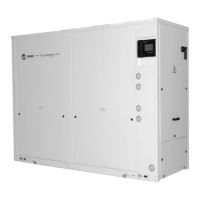
